Is Carrageenan a Harmful Substance?
Before you head out on your next shopping trip, think about the common items you may be buying. Now take a close look at the ingredient labels for those items that are currently in your kitchen. If you are able to identify the small print, you may be astonished at how many food sources contain the additive carrageenan.
Carrageenan is perhaps surprisingly and to your dismay found in organic products which you may have assumed contained only healthy ingredients. But is carrageenan harmful?
Foods Containing Carrageenan
Carrageenan does not add nutritional content or flavor to products. Most foods that contain the suspicious additive are nonfat, low fat or fat free foods lacking the manufacturer’s desired texture for the food product (2).
The following is a list of food sources that commonly contain carrageenan. Which foods did you find list the additive in your kitchen? (2, 3, 8)
- Milk products including almond, rice, soy and even coconut milk
- Cottage cheese
- Ice-cream
- Yogurt
- Frozen dinners
- Organic Juice
- Frozen pizza
- Deli meats such as sliced turkey
- Canned soups
- Sour cream
- Processed sauces and dip mixes
- Infant formula
- Nutritional shakes
What is Carrageenan?
Carrageenan is a “natural” food additive derived from red seaweed and processed with a chemical to neutralize its acidity (2). Introduced to the food industry in the 1930s, carrageenan is a popular ingredient added to foods as a thickening agent to improve the texture and solubility of products (4, 6).
The chemical structure of this additive can contain up to 40% of a sulfur compound. For this reason the degraded form of carrageenan is not allowed for use in the food industry due its known inflammatory effects in animal testing. Once the natural form is degraded, by contact with an acid for example, the sulfur component becomes unstable and reactive. (5)
You may be asking yourself, if an acid will alter the natural form of carrageenan so that it becomes reactive; wouldn’t stomach acid trigger this same effect? That is a great question that one would hope the U.S. Food and Drug Administration (FDA) would have already accounted for. But instead it has been listed as a substance generally recognized as safe (GRAS) since 1973 (7).
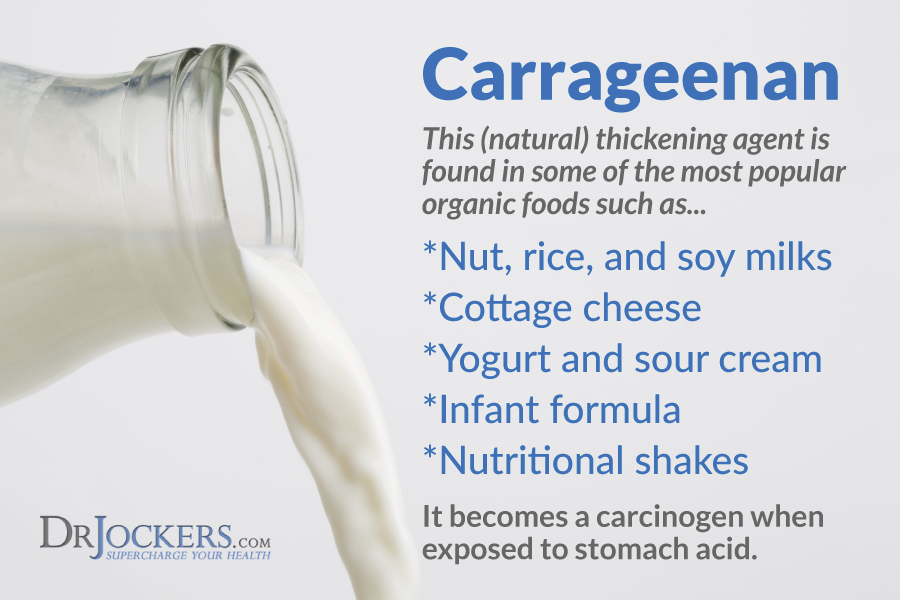
Generally Recognized As Safe Substance
The FDA Committee on GRAS Substances last updated their opinions on carrageenan in 2006 stating that only levels exceeding daily consumption pose a health risk to an individual’s gastrointestinal tract. Now that you have likely found it lurking in many products in your kitchen, how can you possibly assume your daily intake does not pose a health risk given its predominance in the food industry?
The report does cite concern for alarming health complications regarding the possibility that it might pose a risk in pregnant women. These possible side effects include embryonic tissue toxicity and harmful effects to an unborn fetus. Unfortunately, the FDA report only states that their health opinion of carrageenan should be reviewed “once the results of these studies become available.” (7)
The FDA’s requirement to consider foods safe for human consumption once again represents a lack of respect and apathy for having the public’s health interest in perspective. Many studies have now shown that carrageenan in various concentrations promotes chronic disease.
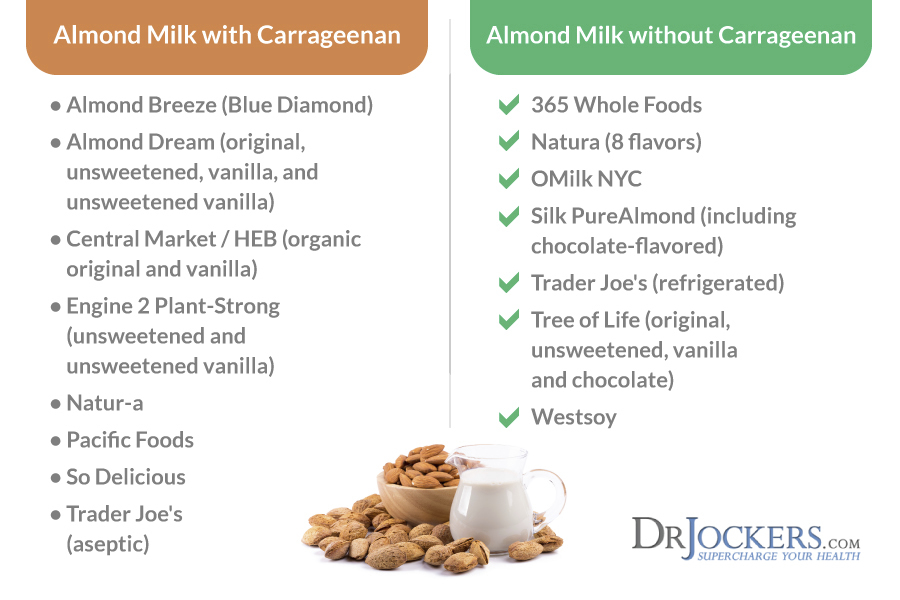
Carrageenan Causes Chronic Disease
Dr. Joanne Tobacman is a physician-scientist who learned of the carcinogenic effects of carrageenan when she studied it 30 years prior to its debut in the food industry. Her research found that it can trigger the development of chronic illness such as diabetes and diseases associated with complications of the digestive tract. (4)
In 1982, The International Agency for Research on Cancer reported sufficient evidence that carrageenan is a likely carcinogen in humans (6). Their findings support Dr. Tobacman’s research that linked it to ulcers and cancerous tissue growth.
Digestion Degrades Carrageenan
Food grade carrageenan has been shown to become readily degraded by the common practice of digesting a meal. Heating, mechanical effects, acid treatment and bacteria digestion contribute to altering the composition of this additive contained in foods (1).
Consider the process of preparing and eating Annie’s organic frozen four cheese pizza which contains carrageenan. A heat source is introduced to prepare the pizza for consumption. Mechanical digestion first begins with chewing and the food is then moved along the esophagus and intestinal tract by peristalsis.
The additive is next exposed to an acidic environment as the body works to absorb nutrients by breaking down the food’s many components. Lastly, depending on the concentration of healthy or harmful bacteria in the intestines, some foods are digested by the bacteria.
Do you recall that the degraded form is not allowed for in food products due to the health risks it poses? Scientists actually introduce an acid to the naturally derived carrageenan which they then use as a pro-inflammatory substance in laboratory testing (2). This very reason has left researchers cautious to recognize it as a safe food additive.
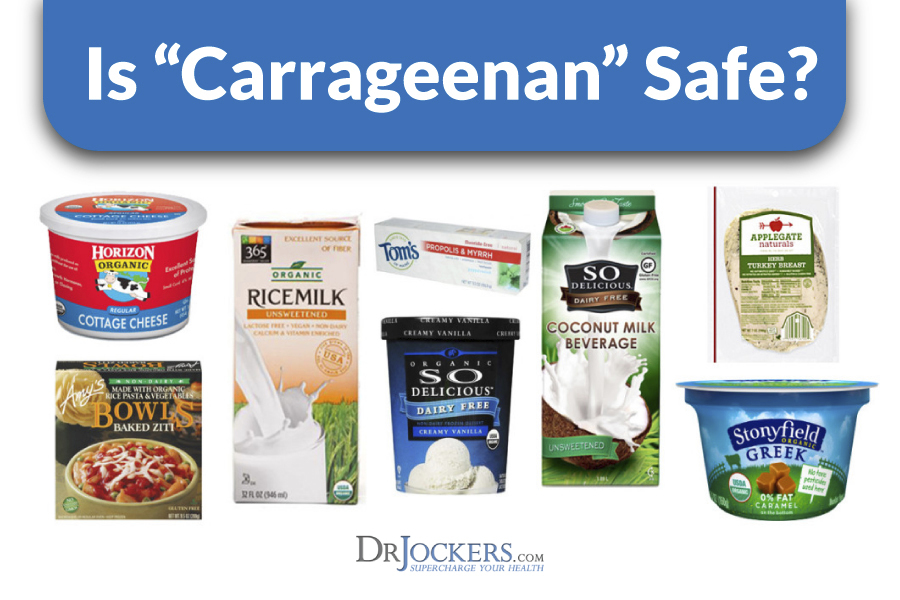
Carrageenan Weakens the Immune System
Although the biological pathways by which carrageenan disrupts normal and health sustaining functions, such as regulating insulin, consistent findings support that it results in a harmful immune response.
Carrageenan resembles a naturally occurring sulfate compound in our bodies that is involved with enzyme function in our intestines. With carrageenan receiving all of the attention, normal cell function and regulation is altered when normal activity by our very own enzymes becomes inhibited. (3)
Possibly due to its high reactivity, carrageenan can interfere with a healthy immune response by altering the body’s natural army front of antibodies (5). Antibodies send signals warning our immune system that a foreign invader has entered and to attack. An unhealthy immune response can lead to inflammation of the gastrointestinal system causing a variety of complications.
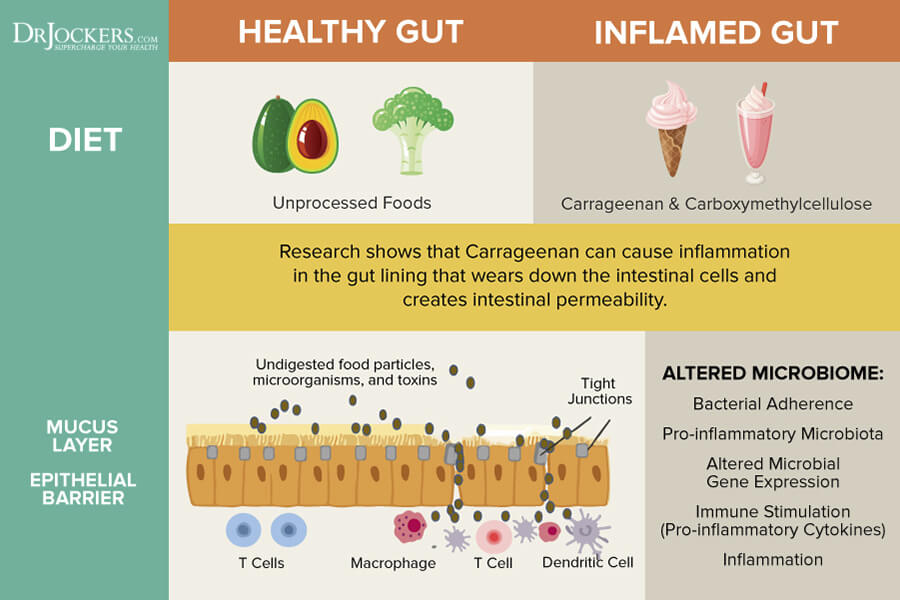
Carrageenan Alters Intestinal Micoflora
Due to the variations in people’s intestinal microflora, or bacteria contained in the gut, researchers suggests that the additive may promote inflammation by altering the type of bacteria present following the consumption of carrageenan. Symptoms associated with altered bacteria concentrations within the gut include inflammatory colon polyps and abnormal tissue growth which can be signs of a more serious health problem. (1)
Studies even propose that the body exhibits the same response to carrageenan as it does to a bacterial infection from Salmonella and its development of disease (2).
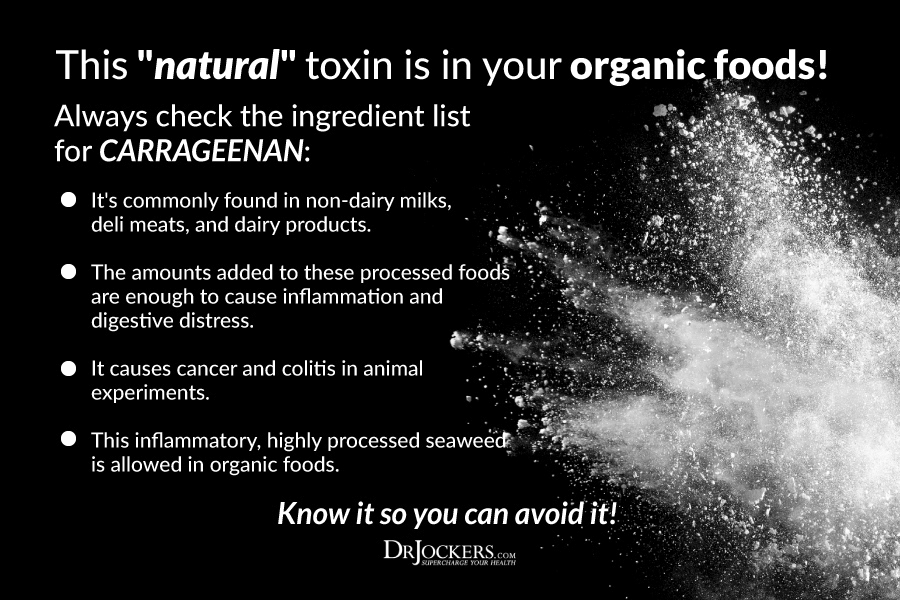
Concern for Chronic Inflammation
If you are constantly exposing your body to unnecessary inflammation by consuming products with carrageenan, you may be putting yourself at risk for a variety of conditions or disease. The following is a list of health problems that may be associated with chronic inflammation of the gut: (1, 2)
- Ulcerative colitis
- Irritable bowel syndrome
- Inflammatory bowel disease
- Diabetes
- Rheumatoid arthritis
- Arteriosclerosis
- Cancer
- Alzheimer’s disease
- Parkinson’s disease
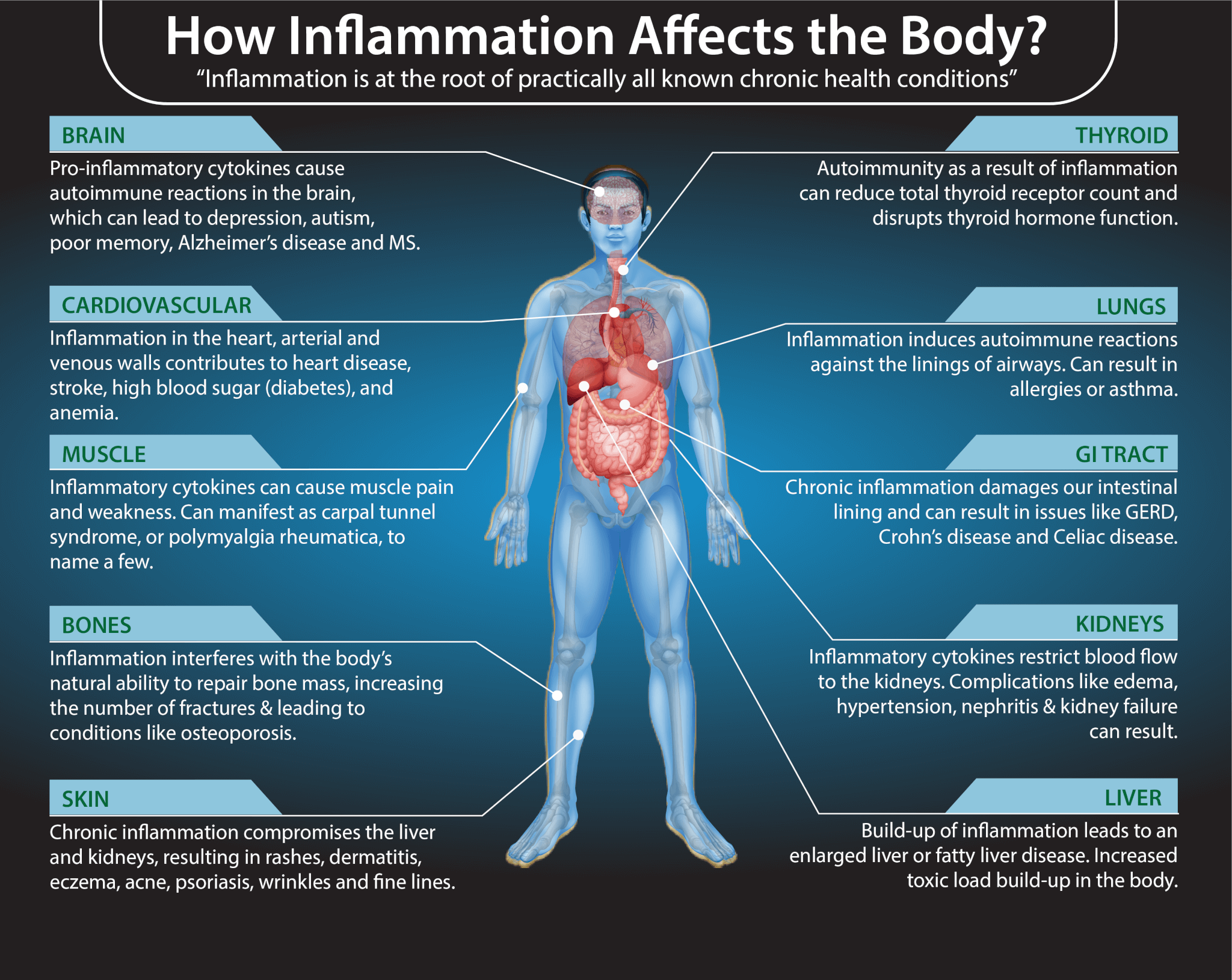
Dosage Uncertainty
With all of the scientific data supporting that carrageenan is harmful to health, you might be asking why the question remains if carrageenan is harmful or not.
Just as the FDA wrote in the report which lists carrageenan as safe for human consumption at the current level of dietary intake, there is no definitive answer to the dosage amount at which carrageenan will cause destruction in the body.
Liver Changes with Carrageenan
Both short and long term studies have conflicting evidence regarding the toxicity of carrageenan in animal lab tests. Scientists have observed weight loss and have detected physical changes to the liver but yet have not found significant health problems resulting as a consequence of these changes. Research shows that the liver and the intestinal wall serve as locations for the storage of carrageenan while other studies lacked this finding. (5)
Exposure to carrageenan daily for a period of time greater than one year found evidence of liver cirrhosis as well as significant findings of loose stool, chronic intestinal disorders, lack of appetite and emaciation regardless of the concentration dose of carrageenan. For these reasons, carrageenan is also medically used in laxatives. (5)
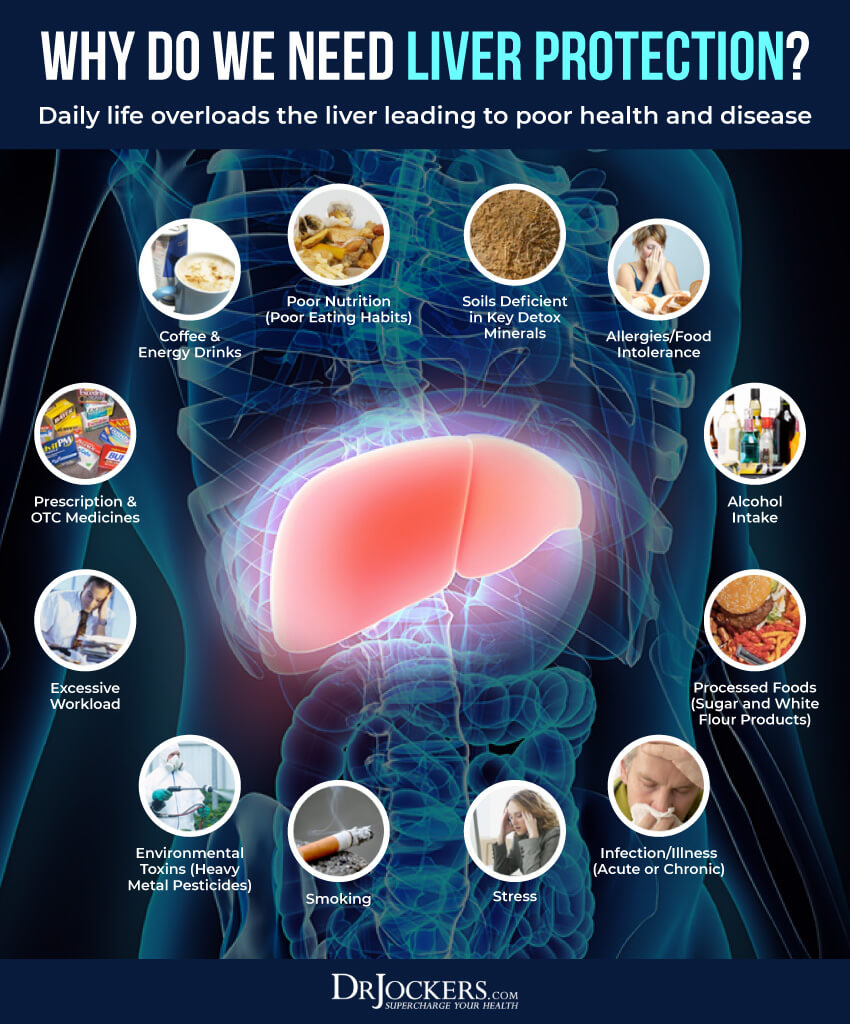
Intestinal Complications
Another study found that a short 45 day daily exposure to carrageenan in small concentrations to guinea pigs, an animal suggested having similar pathological changes as humans have, resulted in significant health consequences (5). Researchers documented ulcerative colitis, intestinal ulcerations, lesions in the rectum comparable to hemorrhaging, and the overall development of disease due to failing health.
Many studies have found that carrageenan in diets activates an inflammatory pathway in intestines (3). A combined effort from the World Health Organization and United Nations have therefore made recommendations to manufacturer’s producing infant formula to steer clear from the use of carrageenan in their products (3, 4). Yet despite this recommendation, many infant formula’s still contain carrageenan.
Problems Regulating Blood Sugar
A consistent finding in studies is the association of reduced insulin activity and increased glucose intolerance when carrageenan is present (2, 4). The biological mechanisms by which the body recognizes and utilizes carrageenan remain a topic for discussion as does its dosage concentration in diets.
In the meantime, if you are at increased risk for type 2 diabetes, it may be wise to caution yourself away from the potentially hazardous food additive.
Possible Benefits
With carrageenan becoming increasingly popular in foods there is obvious concern for the health hazards that it may cause in increased dietary concentrations. As researchers grow more cautious of safely recommending the additive in foods, the additive may have promising potential as a topical cream or nasal spray for use as an antiviral drug.
Although the reactivity of the sulfate group contained in carrageenan may interfere with normal cell function in the body, the reactivity of this additive also exhibits antiviral properties (5). Clinical tests in the future need to be performed which may actually support the use of it in the prevention or treatment of sexually transmitted diseases such as the human papillomavirus or the development of colds from viral infection.
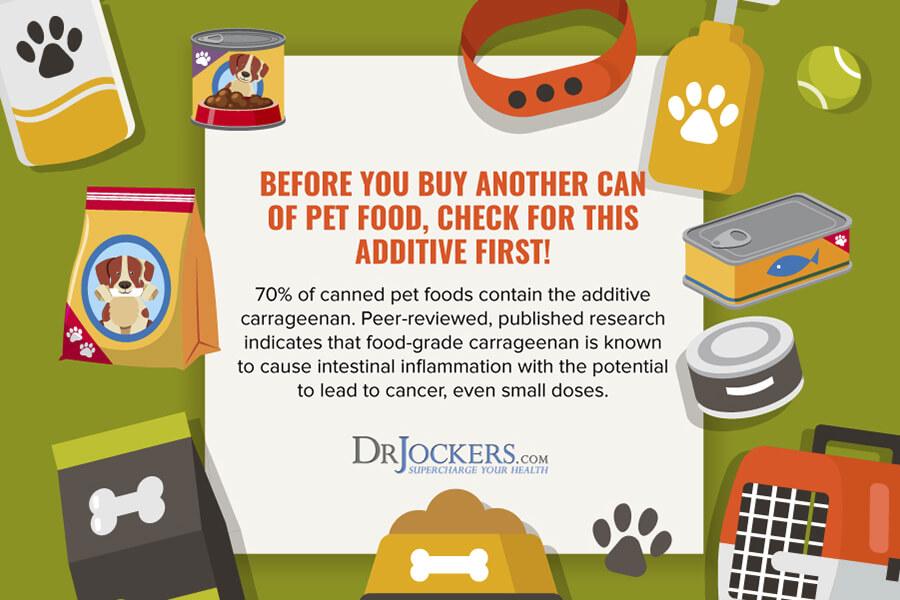
Learn How to Shop Again
As the food industry devises new ways to manufacture their products both quick and cheap, new additives seem to be sneaking into our usual food purchases on a daily basis. We are forced with the added responsibility of educating ourselves with the potential dangers of foods in order to protect our health.
To help you learn how to shop again, there are several tips that you can utilize to keep foods containing carrageenan out of your shopping cart. (2, 3, 8)
- Natural Juices: Purchase shakes and juices that you actually have to shake before drinking. Separation of ingredients can be normal and if the product doesn’t have this requirement, chances are the beverage contains carrageenan.
- Organic Milk: Purchase organic milk from a trusted local farmer or try making your own healthy milk alternative if you seek to avoid dairy. Choose organic powdered formulas if you must buy infant formula.
- Look at Your Supplements: Food isn’t the only thing that goes into your mouth where carrageenan is used. Supplements often contain the additive and gel capsules should be avoided if uncertain. Choose tablets or sublingual drops instead.
- Read Labels: Continue to read labels once you find a product that does not contain the additive. Do not allow the manufacturer to blindly introduce the additive into the product in the future.
- Additive-Free: Remember, organic does not mean additive-free. Major companies such as Stonyfield and Horizon Organic have previously addressed consumer feedback regarding pressure to remove the additive. Unless you plan on utilizing the power of the pen to voice your concern to companies, the power of the dollar is next best in expressing your opinion by not purchasing products with carrageenan.
- Avoid Processed Foods: Carrageenan isn’t the only thing you should be worrying about when it comes to frozen dinners, canned soups and sliced deli meats injected with brine to falsify tenderness and juice. Foods that appear closest to their natural form are the best nourishment for your body’s needs.
The Cornucopia Institute developed a shopping guide with alternatives to both organic and conventional products containing carrageenan. Also listed in their shopping guide are foods in various categories including brand names to help you avoid the harmful food additive. Do not hesitate to switch products and review their shopping guide here. (8)
The Decision is Yours
Unfortunately, agencies designed to protect the public’s interest in human health have fallen short of their responsibilities continually. The FDA claims that carrageenan in food does not represent a health threat “when it is used at levels that are now current and in the manner now practiced.” This statement represents ignorance regarding the amount of carrageenan being consumed by the public or a lack of understanding for the overall function of the human body (7).
Until researchers can confidently support that carrageenan has been consistently shown in both short and long term studies to have no negative impact on human health, it is best to ere on the side of caution than presume ignorance until proven otherwise. Current science may especially suggest that pregnant women and individuals at increased risk of inflammatory conditions such as autoimmune disease or diabetes eliminate it from their diet.
Your health is in your hands and the decision is yours. Will you choose to continue consuming this additive or will you eliminate it from your diet?
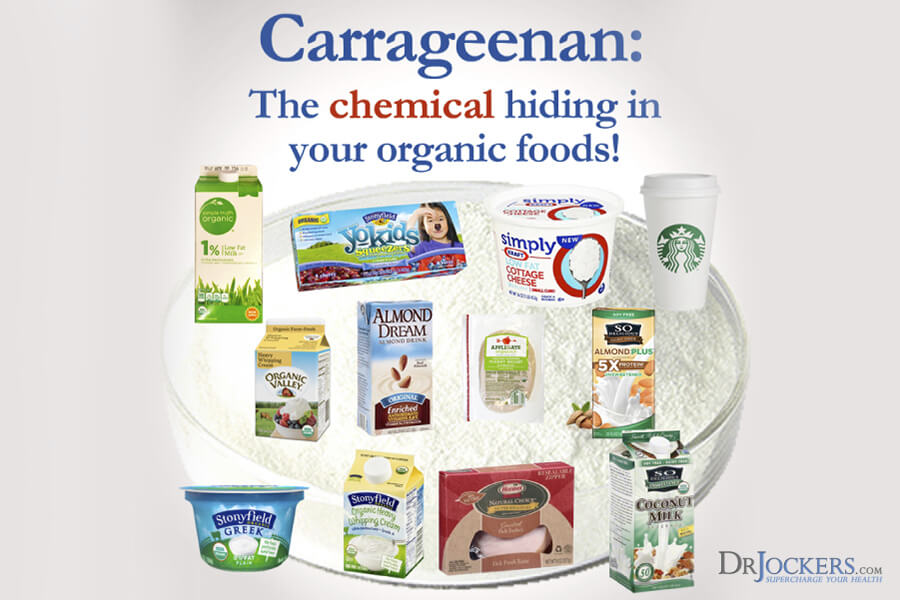

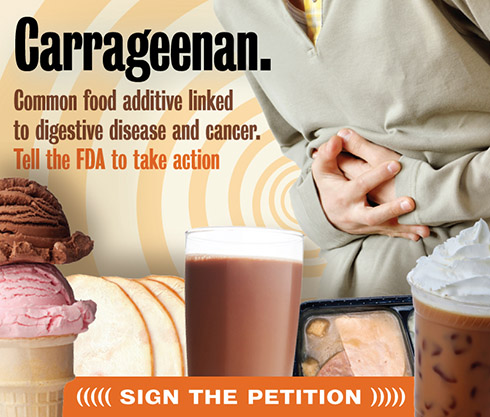
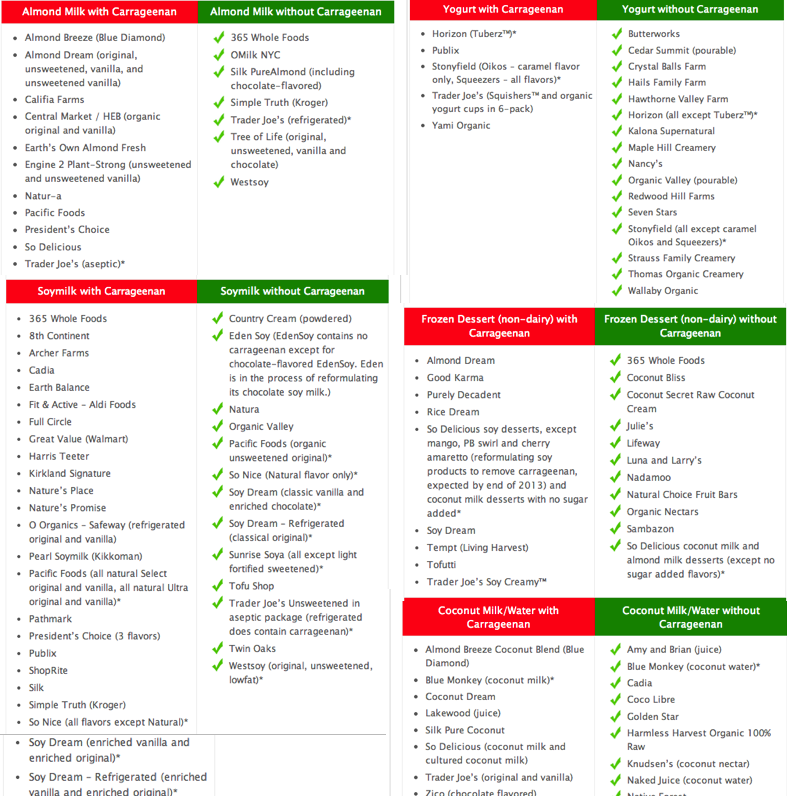

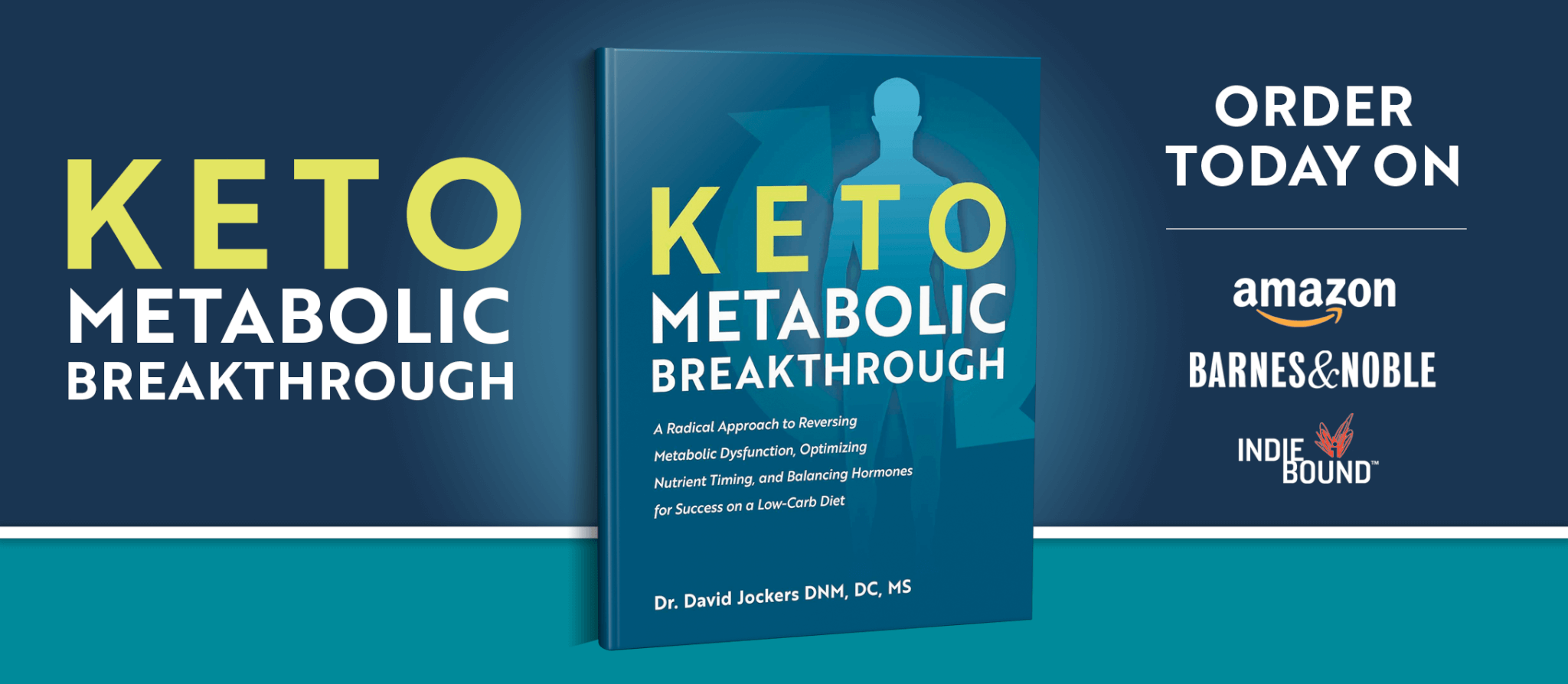


Thank u for this Info this is scary !!
Glad to see this post. Most “health” “experts” in the MSM swear that carageenan is perfectly safe– likely because, like many today, they cannot bring themselves to admit that the mainstream ideas or Government-approved “facts” are generally outright lies.
Carageenan is horrifying stuff. I found out about it only after going vegan some years back. I cheated at first, using all the “vegan” processed foods, purely out of laziness. I used the nut “milk” and other dairy substitutes, and had horrible gastrointestinal issues. I’d have some almond or coconut milk and within an hour would be ill, and would feel bad for up three days afterward! Even switching back to a dairy product didn’t help, because ice creams and other modern dairy products have this crap in them. I’d eat a pint of plain vanilla ice cream as a treat and would be sick for days afterward.
Once I started reading the label, to see what exactly I was eating, I was shocked. So-called “healthy alternatives” to dairy were so full of artificial garbage that drinking dairy milk was actually healthier!
I experimented, and sure enough, eating real ice cream only gave me lactose and sugar symptoms, but none of the horrifying, three-day illnesses I’d suffer from ingesting carageenan. If I had these issues when I didn’t read the label, every time I pulled the package out of the garbage, the label always read “carageenan.”
This stuff should indeed be banned outright, and I always warn people off of it. Suprisingly many people I speak to were looking for a reason to quit fake milk or dairy, thinking it was the lactose that was bothering them. I tell them about the toxicity of carageenan, and they get both an “aha!” moment, and an “oh crap” moment.
Milk exists because babies cannot feed themselves. Adults do not need to drink milk, as they can feed themselves.
My conclusion: milk is for babies, NOT adults. Give up dairy and fake dairy and move on from babyhood!
Sorry you had that experience and thanks for sharing!